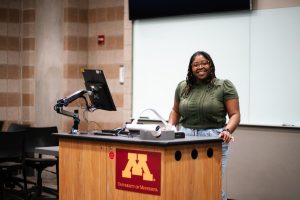Dr. Charles F. Moldow, chief of staff at Veterans Affairs Medical Center in south Minneapolis and a professor of medicine, will replace Dr. James White as Medical School associate dean for research on June 1.
Selected from a pool of 13 internal candidates, the appointment was made Wednesday by Medical School Dean Alfred Michael.
The appointment is one of several initiatives Michael announced in his State of the Medical School Address in January and part of a broader effort on the part of the Academic Health Center to strengthen ties with Minnesota’s medical industry.
In addition to expanding the position’s responsibilities and authority, Moldow will develop and define the associate dean’s new role, said Greg Vercellotti, senior associate dean for education and chair of the candidate review committee. Although the job is slated as a part-time position, it is unclear as to whether it will remain so, he added.
As a member of a renovated grants support staff, Moldow will join the Grants Management Committee, which formed in 1995 following a negative review from a federal research and funding agency, the National Institutes of Health.
The University received an “exceptional” rating; in NIH vernacular, the term means out-of-the ordinary, as opposed to meaning above average.
As associate dean, Moldow will also chair the Medical School’s faculty research council as well as work with the Research Services Organization, a one-year-old office established by the health center to connect the industry and the University.
Moldow, along with the other candidates, faced two days of review by a 15-member council of professors, administrators, an industry representative and a medical school student.
No rigid criteria was set for the review process, said Jennifer Nagode, the medical school student who sat on the committee.
Instead, candidates were selected for their enthusiasm, ideas and suggestions for the position, Nagode said.
“We were all asking ‘What would you do?'” said Nagode, “not ‘Will you do what we want?'”
No earth-shattering ideas emerged from the two days of interviewing, Nagode said.
Each reviewer on the board brought their own set of criteria to the process. As a student, Nagode said she was interested in the candidates’ ideas about mentorships, funding and strategies for recruiting top students to the University.
Nagode is working toward a professional and academic doctorate, and said she would also like to see the new associate dean promote a closer relationship between the basic and clinical sciences.
The ideal candidate would have enthusiasm for the job, communication skills and the ability to prioritize projects and areas of growth, said committee member Thomas Meskan, president and executive director of Medical Alley, a trade industry group.
Communication is crucial, he added.
From an outsider’s perspective, Moldow’s reputation as a good administrator and his ability to work through bureaucracy to bring several separate groups together made him a strong candidate, Meskan said.
Health care today is not just about one college or one discipline, Meskan said. Minnesota’s bio-medical industry is looking to the University for sincere efforts at communication.
The University is “not just an ivory tower, but in fact, an interactive enterprise,” Meskan said.








